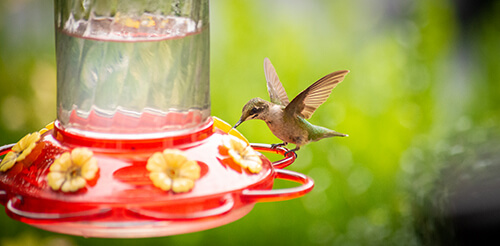Feeding Hummingbirds
May 11, 2020

Spring is here, and so are the hummingbirds. These sweet little animals are so fun to watch as they slitter and fly from feeder to feeder, and care for them is easy and manageable. Check out these tips on mixing hummingbird food, selecting a feeder, and other important elements to keep in mind.
Mixing hummingbird food
These little birds need and love the sweet mix of hummingbird sugar water. The recipe is one cup of white cane sugar to three to four cups of water. Cane sugar is the best, but beet sugar will also work. Do not use any other types of sugars, honey, or sugar substitutes. Spring or tap water is fine. Warm the water to dissolve the sugar, but make sure it cools before putting it out for the birds. Do not use food coloring.
If you start to attract bees and wasps near the feeders, dilute the mixture to five cups of water per one cup of sugar.
Selecting a feeder
The first thing to consider when choosing a feeder is to find one you are willing and able to clean. The mix needs to stay fresh and should be changed every four to five days. If the mixture is not consumed between cleanings, do not fill it up completely for the next feeding. Match your feeders to the number of visiting birds you have. Often times, more feeders are better for the birds because they become less territorial and all get to eat. Again, if you start seeing a bee problem, it is the feeder’s fault. A correctly designed feeder will ensure bees cannot access the sugar water mix.
Location is also incredibly important. Hang the feeders at least four feet above the ground, out of reach of predators. Also, to protect the birds, hang the feeders away from their nests. Feeders and nests in too close proximity can cause predators to take a toll on their population. Hang feeders in a shady spot where you can enjoy the birds, and they can enjoy their lunch.
Keep in mind
Mixing hummingbird food
These little birds need and love the sweet mix of hummingbird sugar water. The recipe is one cup of white cane sugar to three to four cups of water. Cane sugar is the best, but beet sugar will also work. Do not use any other types of sugars, honey, or sugar substitutes. Spring or tap water is fine. Warm the water to dissolve the sugar, but make sure it cools before putting it out for the birds. Do not use food coloring.
If you start to attract bees and wasps near the feeders, dilute the mixture to five cups of water per one cup of sugar.
Selecting a feeder
The first thing to consider when choosing a feeder is to find one you are willing and able to clean. The mix needs to stay fresh and should be changed every four to five days. If the mixture is not consumed between cleanings, do not fill it up completely for the next feeding. Match your feeders to the number of visiting birds you have. Often times, more feeders are better for the birds because they become less territorial and all get to eat. Again, if you start seeing a bee problem, it is the feeder’s fault. A correctly designed feeder will ensure bees cannot access the sugar water mix.
Location is also incredibly important. Hang the feeders at least four feet above the ground, out of reach of predators. Also, to protect the birds, hang the feeders away from their nests. Feeders and nests in too close proximity can cause predators to take a toll on their population. Hang feeders in a shady spot where you can enjoy the birds, and they can enjoy their lunch.
Keep in mind
- Take the feeders down in the fall, at least three weeks after the last hummingbird sighting
- Clean the feeders often and well, including once a month with bleach
- Do not top off the feeders without cleaning first
- Match number of feeders to size of bird population
- Hummingbirds don’t eat sugar alone; they rely on spiders and small insects for protein
- Watch for bees and wasps and change the type of feeder if they are persistent